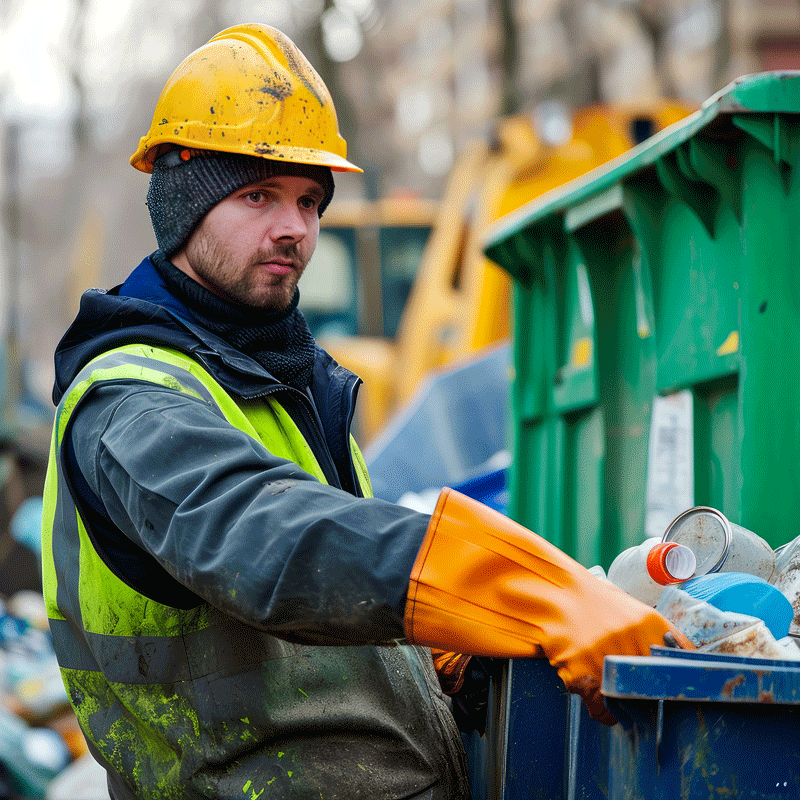
New Business Recycling Rules 2025
This spring will see changes in business recycling rules; here’s all you need to know. This
What type of waste do you need to dispose of?
Last updated 23/06/2025
All businesses produce waste, but not all of them produce hazardous waste. Hazardous waste is, according to the UK Government, waste that is harmful to humans or the environment. This is quite a broad term, and it’s not always clear exactly what kind of waste this includes, but here are some examples:
If you are unsure about whether the waste your business produces is classed as hazardous, you need to check before you send it for disposal. This means that anyone who deals with it can do so properly.
This page takes you through how you should go about managing the hazardous waste you produce, as well as the regulations that exist around it. If you want a general insight into managing your waste more broadly, read our commercial waste guide to get everything you need to know.
Managing hazardous waste involves gathering and processing materials classified as hazardous. Specialised teams and equipment need to be used to minimise the harm done to both human health and the environment.
Unsurprisingly, the management of hazardous waste is more costly than general waste management, but it’s also far more important. There are several laws in place to ensure that businesses that produce or deal with hazardous waste do so properly; whether your business is small or large, you need to make sure you remain within the strict guidelines. Not doing so could result in legal action. A breakdown of the hazardous waste regulations can be found further down this page.
What type of waste do you need to dispose of?
The first step in managing your hazardous waste is classifying it as such. In fact, before your waste can even be sent off for disposal, it needs paperwork attached to it that describes its nature. This will include what the waste is, where it was produced, and a chemical analysis of its components.
You will usually be able to see if your waste is hazardous from the waste code associated with it, but if not, you can check the Government’s technical guidance on waste management.
In the case of hazardous waste, you need to make sure that the company or individual responsible for disposing of it is equipped to do so. Not all waste management companies are able to deal with hazardous waste, so you need to work with one that does. If you’re currently looking for such a company, we’ve conveniently compared the top five waste management companies in the UK, which is a good place to start your search.
In England and Wales, hazardous waste management is governed by the Hazardous Waste Regulations 2005. The act sets out the rules for controlling and tracking the movement of hazardous waste and compels those who produce or handle it to have a workable waste management plan.
As per the regulations, managing hazardous waste requires the gathering and processing of materials classified as hazardous. Specialised teams and equipment also need to be used to minimise the harm done to both human health and the environment.
Following the rules is not a choice; you must follow the regulations fully to avoid any health risks to you or your staff.
Something else that won’t come as a surprise: businesses that work with hazardous waste are liable to be inspected by various organisations, including the Department for Environmental Health. It’s the job of such government bodies to ensure your business is following the rules when it comes to its waste.
Failing to comply with the rules can result in several penalties. According to the regulations, the UK Government has the power to issue everything from cautions and on-the-spot fines to fully-fledged criminal prosecutions. Obviously, your business could do without any of this hassle, which means you’re better off ensuring you fully comply with the regulations.
Aside from avoiding any penalties, following the rules also means the risks posed to you, your staff, and the surrounding environment are kept at a minimum.
The regulations set out a vast number of rules which, for many business owners, can seem daunting and hard to understand. So extensive that it would be impractical to list all of them here. They describe exactly how hazardous waste needs to be dealt with, right from its production to its disposal.
The list below takes you through the most important aspects of hazardous waste regulations. According to the regulations, your business must:
While the above list is only a brief breakdown of the Hazardous Waste Regulations, it does provide a rough guide on how to conduct your waste management plan. If, however, you want to see the regulations in their entirety, have a look at the UK Government’s website.
With all that said, it should be clear that managing your hazardous waste properly is a big deal. However, because it’s neither simple nor something you can get wrong, it’s best to leave a lot of it to professionals. Essentially, you need a waste management firm.
If you’re reading this and you’re thinking that you need a proper waste management provider to help you out with your business’s hazardous waste, you’re absolutely correct. The good news? We’ve already done the research and found the best waste management providers in the UK. Lucky you!
If you’re ready to find the best hazardous waste management company for you, click the ‘start free quote’ button on this page, or answer the question below to start comparing prices today. Our free-to-use service sources multiple waste collection providers based on your specific needs. All quotes are no strings attached, so if you don’t like the look of what you see, no problem.
If it’s a commercial waste management plan you need, commercial experts are the ones who know how to find one that suits you.
What type of waste do you need to dispose of?
In England and Wales, hazardous waste management is governed by the Hazardous Waste Regulations 2005.
The act sets out the rules for controlling and tracking the movement of hazardous waste and compels those who produce or handle it to have a workable waste management plan.
The UK Government says that waste is considered hazardous if it is “harmful to humans or the environment.” Some common examples of hazardous waste include:
You need to be licensed to dispose of commercial hazardous waste. As an alternative to this, many small businesses use waste management companies that take their waste for disposal. If you are unsure if your waste is classed as hazardous, you need to check before you send it for disposal.

This spring will see changes in business recycling rules; here’s all you need to know. This

Your guide to the best waste solutions for your business. Your guide to the best waste

While it’s a boring topic, having a good waste plan is key to your business. Here’s




CommercialExperts.com helps savvy UK businesses to save time and money by comparing a wide range of essential products and services.
© TFLI 2025 All rights reserved. Licenced by the Information Commissioners Office, (Registration Number Z3585914) Registered in the UK, number 08424810. Registered Office Address: First Floor, Beechwood Court, Springwood Way, Tytherington Business Park, Macclesfield, Cheshire. SK10 2XG.